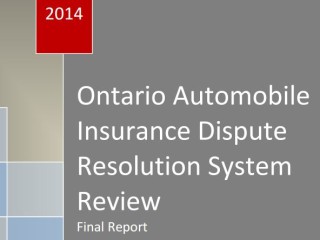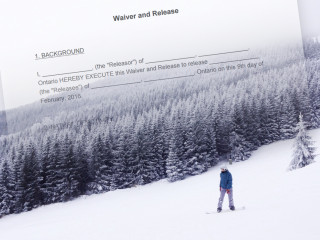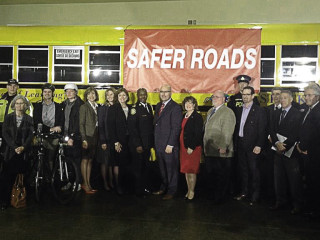This is a Costs Hearing subsequent to the Judgment by Healey J., with respect to a Motor Vehicle Accident Claim with a particular focus on SABS deductibility
Released March 7, 2017 | Full decision [CanLII]
Two of the most pressing issues to be decided by the Court were:
- The amount, if any, of any deduction for collateral benefits to be made from Meaghan Dunk’s award;
- The scale and quantum of costs to be awarded to Meaghan Dunk, plus disbursements.
SABS Deductibility
The Jury awarded $41,494.00 for future healthcare. The Defendant’s position was that the figure should be replaced with $27,500.00 based on the following deductions of $23,500.00 for past and future medical/rehabilitation benefits and $4,000.00 for past and future attendant-care benefits as a result of her prior SABS settlement. In support of their position the defendant’s relied upon Mikolic v. Panguay 2016 ONSC 71 interpreting s. 267.8 of the Insurance Act.
This Plaintiff argued that the defendants are not entitled to deduct these amounts from the final judgment awarded by the jury for future healthcare expenses. In support of their position the Plaintiff’s relied upon Gilbert v. South 2014 ONSC 3485, aff’d 2015 ONCA 712. The SABS claim was settled on the basis that medical benefits and attendant care could only account for ‘past’ benefits since this Plaintiff was not determined to be CAT. There was no ability for this Plaintiff to be compensated for future healthcare benefits as a result thereof. It was argued that there is no SABS deductibility with respect to the jury verdict for any future healthcare award because there was no actual overlap between what the SABS carrier paid and the jury award.
Healey J., rejected the defendant’s position at [10]:
Just as was the case in Gilbert v. South, the record does not allow this Court to conclude that Meaghan Dunk’s future medical care benefits overlap with the jury’s award for future care cost. As in Gilbert, as Meaghan Dunk has not claimed to be catastrophically impaired, her entitlement to medical and rehabilitation benefits could not extend beyond the earlier of the receipt of benefits totaling $100,000.00 or ten years from the accident date. In awarding damages for future health care, the jury was not asked to differentiate between medical and rehabilitation benefits and attendant care benefits, and was further not asked to quantify those expenses that might fall outside the prescribed limitation period for each benefit.
Based on this analysis, Healey J., concluded that the defendant failed to satisfy the very strict onus as described in Cowles v. Balac 2005 CanLii 2038, aff’d (2006) 83 O.R. (3d) 660 (C.A.) that benefits received for SABS settlement must truly overlap with the amounts awarded by the jury for future health care.
Partial v. Substantial Indemnity
The jury’s verdict totaled $975,060.00. The Bill of Costs of this Plaintiff totaled $427,200.00. The partial indemnity scale was calculated to May 15, 2016, and substantial indemnity from May 16, 2016, onward and corresponding with the first day of trial. The defendants position was that there was no Rule 49 that would attract cost consequences pursuant Rule 49.10.
This Plaintiff served a Rule 49 on May 4, 2016, for $975,000.00 ++. This offer withdrew all other offers. The following day, this Plaintiff served an amended offer for $975,000.00 inclusive of interest, plus costs and disbursements. This offer withdrew all other offers. The final offer to settle was served on May 12, 2016, and was $750,000.00 inclusive of interest, plus costs and disbursements. This offer to settle was made to run concurrently with an offer to settle dated July, 30, 2015.
The Defendants position was supported by Mills v. Raymound 1997 CarswellOnt 4075 (C.A.) which stands for the principle that an original offer to settle does not continue to remain open for acceptance once a new offer to settle is served.
Healey J., rejected the defendant’s argument at para [21] by stating:
That is not so here. The wording contained in Meghan Dunk’s May 12 Offer explicitly drew to the defendants’ attention that the Amended Offer remained operative and in full effect. This, in combination with the explicit wording in the covering letter, could leave no doubt about the plaintiffs’ intentions. Unlike the situation in Mills v. Raymond, there was a time lapse of only five days between the offers. In this situation, I find that the explicit qualification contained in the May 12 Offer had the effect of not revoking the Amended Offer, as would otherwise be the situation.
Costs and Disbursements
Healey J., pursuant Yetman v. Marzec 2014 ONSC 4624 fixed costs rather than assessing them, relying on Eberhard J., when she indicated that fixing costs as opposed to assessing them is ‘relying in my exercise of discretion on the Court’s collective experience with personal injury litigation’.
The primary objection to the fees sought by this Plaintiff is the excessiveness of the time spent on this matter having regard to the comparative time spent by defence counsel. Counsel for the defence provided a Bill of Costs of $251,190.00.
The problem with this argument, according to Healey J., is that it fails to recognize the additional work that accompanied the onus that rested on the Plaintiff to prove her claims. This included the time spent on liability, which was not settled until three days prior to the commencement of trial. Further, the Plaintiff provided significantly more evidence than the defendants on the issue of damages. As recognized by Wilson J. in Hoang v. Vicentini, 2014 CarswellOnt 14913 (S.C.J.), at para [78] “the Plaintiff must build the case before the jury and this requires expending more hours than the defendants have to do to defend the case.”
In addressing the hourly rates set out in the respective Bills of Costs, Healey J., noted at para [30] that: Using the Bank of Canada’s inflation calculator, the comparative maximum 2016 rates, adjusted for inflation, are as follows, but these maximum hourly rates are intended to provide guidance and are not mandatory:
- law clerks: $97.90/hr;
- student-at-law: $73.28/hr;
- lawyer (less than 10 years): $274.79/hr;
- lawyer (10 or more and less than 20 years): $366.38/hr;
- lawyer (20 years or more): $427.45/hr.
In assessing the quantum of costs, the court must be governed by the reasonable expectations of the unsuccessful party. The Defendants retained a firm specializing in insurance defence work. The actual hourly rates of their senior counsel is$395.00/hour. The client funding the defence is not unsophisticated and would understand the range of billing rates/ costs of litigation. The Defendants would have had explained to them the costs consequences of rejecting the Plaintiff’s offers.
While Healey J., accepted a 15% ‘deduction across the board’ for disbursements, as suggested by this Plaintiff, the defendant took issue with the cost of medical professionals who were retained by this Plaintiff to advance her claim, but did not testify at trial. In rejecting the defendant’s argument to reduce disbursements by subtracting those costs, Healey J., indicated that:
these professionals cannot be expected to provide their expertise, work product and time, even if that means scheduling time away from their practice that ultimately is not needed for the trial, without ample compensation. The plaintiff’s counsel would not volunteer to provide these payments were they not demanded and necessary at the time they were incurred. Accordingly, some of the defendants’ objections involving larger sums cannot be sustained.
Healey J., at para [40] ultimately held that no amount would be deducted from this Plaintiff’s award for future health care and held that the Defendant’s shall pay this Plaintiff costs in the amount of $387,343.00 and disbursements in the amount of $132,040.00 – inclusive of HST.
Counsel for the Plaintiff: Robert Littlejohn & Marc Lemieux
Counsel for the Defendant: Mary Teal
Read the full decision on CanLII









